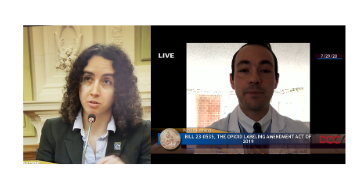Health Equity
Medicaid Enrollment Touches 39% of the Residents of The District of Columbia; DC’s 70/30 FMAP is Vital for the Maintenance of Health & Human Services
A reduction in the District’s FMAP would not lead to long-term government savings and would have a ripple effect throughout the entire health system in the DMV, crippling access to care for not only Medicaid beneficiaries but also all those who live, work, and visit the District of Columbia, including members of Congress and their staffs.
.png?sfvrsn=9ac2d21b_0)
Why does DC receive an Enhanced FMAP Rate?
The DC FMAP rate of 70% established by the Revitalization Act resulted from bipartisan analysis, discussion, and negotiation by Congressional leadership aiming to balance fairness with the District’s restricted ability to generate revenue. Congress recognized that the District of Columbia faces unique financial challenges due to its non-state status and the significant amount of federally-owned land within its boundaries. The District is unable to tax non-residents’ earnings, so these workers pay no taxes to support the infrastructure and services, such as roads, public safety and emergency services that they benefit from in the District. The District is also unable to tax up to 40% of the real property within its borders due to statutory restrictions.
Why are we concerned about DC's FMAP now?
Members of Congress have proposed reducing the DC FMAP to the statutory minimum for all other states, which is currently 50% (but could be reduced even more). Such a change would impact every physician and every practice, regardless of type, location, and payers contracted. Even practices who take no insurance will not be able to send patients for specialist care, hospital admissions, or other types of care.
What can MSDC members do?
- If you know a member of Congress or staffer, reach out to them and share how DC cuts will hurt your patients.
- Share your relationships and outreach with hay@msdc.org so we can help coordinate advocacy efforts.
- Email hay@msdc.org if you would like to be paired with a physician member of Congress office and trained by MSDC staff on how to reach out.
Resources
- DC FMAP cut fact sheet
- California Medical Association fact sheet on Medicaid cuts
- MSDC and healthcare association letter to Congress arguing against DC FMAP changes.
- MSDC original story on Medicaid changes.
News, Statements, and Testimony on Health Equity Issues
DC Vaccine Bill Passes First Council Vote

On Tuesday, the full Council of DC voted to pass The Minor Consent for Vaccinations Amendment Act. The bill must receive a second full Council vote before going to the Mayor for her signature.
The bill would permit a minor deemed informed and mature by their physician to receive a vaccination without parental consent. The bill's aim is increase herd immunity in the District's school age population and combat falsehoods about vaccines' impacts.
While the District maintains a high vaccination rate among school-aged children, the rate last year dropped below the 95% vaccination rate generally considered necessary for herd immunity.
The Medical Society and DC Chapter of the American Academy of Pediatrics worked on this legislation with Councilmember Mary Cheh's office and Chair Vincent Gray's Committee on Health staff. Councilmember Cheh noted at the Council meeting that the bill allows physicians to be "gatekeepers" of the informed consent standard.
The bill passed with only one dissenting vote, which came from Councilmember Trayon White. The Councilmember expressed concerns about the history of medical treatments as well as parental rights on medical treatments for children. MSDC points out:
- The minor would have to prove maturity and knowledge of vaccines before a physician would permit the vaccine to be given
- Vaccines are shown to be one of the safest medical treatments available, and many of the misnomers of vaccine effects have been roundly debunked
- Minors can consent to medical treatment without parental consent in the District around abortion, birth control, STD treatments, and behavioral health.
Chairman Gray thanked the Medical Society of DC and DC Health for working with the Council and committee on the bill's language.
At the same meeting, the Certificate of Stillbirth Act and Opioid Labeling Amendment Act both passed without objection. MSDC PLAN Chair Dr. Sam Kareff testified in favor of both bills at the July hearing.

Leave a comment